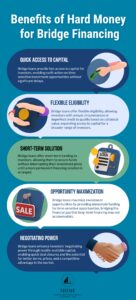Benefits of Hard Money Loans for Bridge Financing
Bridge financing is a valuable strategy that allows investors to borrow funds short-term while awaiting long-term financing. For instance, suppose an investor is looking to buy a new property, but they’re waiting for their current property to sell before they can fully finance a new one. A bridge loan can help provide immediate funds while they wait for the property to sell and secure a more long-term solution. In today’s article, we’ll go over some of the benefits of bridge financing for real estate investors and some disadvantages to remember.

Contents of This Article:
- What Is Bridge Financing?
- How Can Bridge Financing Help Investors?
- Benefits of Hard Money for Bridge Financing
- Disadvantages of Bridge Financing
- Find a Reputable Local Lender in Maryland
What Is Bridge Financing?
Bridge financing is a short-term form of financing used to “bridge” the gap between the immediate need for capital and the availability of a more permanent, long-term solution. Typically, borrowers use bridge loans when they need quick funds to take advantage of time-sensitive opportunities while they wait to finalize a more permanent financing arrangement.

Bridge financing is commonly used in real estate transactions, like when a homebuyer needs to secure funds for a new property while waiting to sell their current property. Additionally, businesses can use them to cover expenses during a transitional period, such as waiting for long-term financing.
Bridge loan terms and conditions can vary depending on your Baltimore hard money lender and the specific situation. However, it generally involves higher interest rates and shorter repayment periods than traditional loans. Additionally, loans are secured by collateral, like the property being purchased. Once the borrower finds permanent financing for their investment, they can repay the bridge loan in full.
How Can Bridge Financing Help Investors?
Bridge financing can be an effective tool for investors to bridge temporary financial gaps and take advantage of opportunities that require immediate capital. Some deals happen quickly, and bridge financing allows investors to quickly access funds before an opportunity slips away. Whether it’s a distressed property, a limited-time investment, or a quick market opportunity, bridge financing ensures investors can act swiftly and secure necessary funds.
Additionally, investors may encounter situations where their existing financing arrangements are insufficient or temporarily unavailable. Bridge financing can fill the gap by providing short-term funding until the primary financing is secured or alternative arrangements are made. In turn, investors can make investment plans without delays or disruptions.

Finally, bridge financing enables investors to diversify their investment portfolios by accessing short-term capital. As such, it allows them to explore new investment opportunities and allocate funds across various sectors or asset classes.
That said, prospective investors need to carefully evaluate the terms and conditions of bridge financing. For instance, investors should consider the terms, costs, and risks associated with the loan. While bridge loans are helpful, they can have higher interest rates and fees. So, it’s important to consider all of the pros and cons before using this financing method. Stick around while we review the benefits and disadvantages of hard money loans for bridge financing.
Benefits of Hard Money for Bridge Financing
It’s crucial for investors to carefully consider the terms, costs, and risks associated with bridge loans before utilizing them. Conducting thorough due diligence, assessing your finances, and consulting with professionals can help investors make informed decisions and maximize the benefits of bridge financing. That said, here are some of the main benefits to consider.

- Quick Access to Capital- Bridge loans provide investors with immediate access to capital, allowing them to act swiftly on investment opportunities. So, in time-sensitive situations where speed is essential, bridge loans can help investors secure funding without major delays.
- Flexible Eligibility- Bridge loans offer flexibility regarding eligibility criteria and collateral requirements. So, investors with unique circumstances or less-than-perfect credit can still qualify for bridge financing based on the value of their collateral. As such, this flexibility gives a wider range of investors access to capital for their investment needs.
- Short-Term Solution- Bridge loans provide temporary funding until a more permanent financing solution, like a conventional mortgage or long-term loan, can be arranged. This allows investors to bridge the gap and secure funds without pausing and affecting their investment plans.
- Opportunity Maximization- Bridge loans enable investors to take advantage of investment opportunities that require immediate funding. So, whether it’s a distressed property, a short-term investment with high returns, or a time-limited opportunity, bridge loans can bridge the financial gap and allow investors to seize opportunities that may not be feasible with long-term financing.
- Negotiating Power- Bridge loans can enhance investors’ negotiating power by providing them with readily available capital. With the ability to quickly close deals, investors may be able to negotiate better loan terms, secure favorable prices, or gain a competitive edge in the market.
Disadvantages of Bridge Financing
While bridge financing can provide valuable short-term funding solutions, it’s important to acknowledge certain disadvantages. Here are some important points for investors to consider.
- Higher Interest Rates- Bridge loans generally carry higher interest rates than traditional long-term financing options. However, the high rates reflect the increased risk associated with short-term loans and the quick access to capital they provide. Unfortunately, this can result in higher borrowing costs for investors.
- Shorter Repayment Period- Bridge loans typically have shorter repayment periods, ranging from a few months to a few years. This shorter timeframe can pressure investors to secure more permanent financing or come up with the funds to repay the loan within a short period.
- Additional Fees and Costs- In addition to higher interest rates, bridge loans may entail additional fees and costs. For instance, costs may include origination fees, appraisal fees, underwriting fees, and prepayment penalties. As such, it’s crucial for investors to carefully review the terms and conditions to fully understand the associated costs.

- Higher Risk- Bridge financing inherently has more risk due to its short-term nature and reliance on future financing. After all, investors must assess their ability to secure long-term financing or generate enough funds within the given timeframe. If you’re unable to secure funds, it may be challenging to repay the loan.
- Limited Availability- Bridge loans may not be as widely available as traditional financing options. Investors must rely on private lenders or specialized financial institutions that offer bridge loans. The limited availability may restrict the number of options and lenders to choose from, which may affect loan terms and costs.
Find a Reputable Local Lender in Maryland
Whether you’re looking for short-term financing or want to find quick financing for a fix-and-flip loan, it starts with finding a reputable lender. Regardless of your reasoning for getting a loan, it’s crucial to research local lenders and find one that aligns with your goals and timelines. Remember to look at interest rates, fees and costs, and the lender’s experience with hard money loans.
That said, if you’re looking for a trusted lender in Maryland, look no further than Maryland Hard Money Loans. Whether you’re looking for a bridge loan or a hard money loan for a short-term project, we’ve got you covered. Contact us to learn more about our lending process, and fill out a loan application today!



